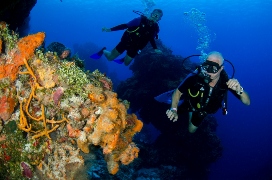Doctor of Philosophy in Ocean Sciences
UC Santa Cruz
Santa Cruz, CA
The program leading to a doctorate in ocean sciences is designed around a core training in oceanography for all students, supplemented and focused by advanced training in oceanography and in the traditional disciplines—biology, chemistry, Earth sciences, and physics—as chosen by the student and their advisers. The core training is provided through courses in ocean sciences; a subset of which is taken by all students in the first two years, and reinforced by attendance of department seminars throughout the program. Preparation also includes upper-division/graduate courses in ocean sciences and in the specialty discipline, graduate seminars, independent study research credits, giving research talks, and a minimum requirement of one quarter as a teaching assistant. There is no formal language requirement. Students admitted to the Ph.D. program may receive a master's degree en route to the Ph.D after meeting the requirements for the M.S. II and successful completion of the Departmental Exam.
A scheduling meeting in the first quarter of enrollment is used to map out the course program in the first year. The course program is determined by a faculty advisory committee in consultation with the student and courses are drawn from Ocean Sciences and other science departments (e.g., Biology, Chemistry and Biochemistry, Earth and Planetary Sciences, Physics). A departmental oral examination covering material from the core courses is taken at the end of the student’s first year in the program, typically during finals week of spring quarter. The purpose of this examination is to ensure that the doctoral student candidate has acquired sufficient fundamental knowledge of oceanography to proceed toward the doctoral degree.
A qualifying examination, requiring a ~15-page NSF-style written research proposal covering three chapters, is to be defended orally in front of the student's qualifying examination committee. The dissertation will demonstrate original thought and research. This examination is recommended to be taken during the fall quarter of the third year, and no later than the end of the spring quarter of the third year.
Sample Pathways
The pathways within the ocean sciences Ph.D. program are differentiated from related degrees in the traditional disciplines by their focus on global-scale problems and interactions, a focus on the ocean, and their inherently interdisciplinary approach. Interdisciplinary projects across and between pathways are encouraged, as are interactions with faculty in related departments.
Biological Oceanography
This area of study involves the interactions of organisms with their chemical and physical environments. It includes research on the physiology and ecology of organisms, but differs from marine biology in its focus on the oceanographic setting of the organism in relationship to, for example, biogeochemical cycling and the effects of ocean currents on distributions of organisms.
Chemical Oceanography
The measurement of chemical distributions in the sea to understand fundamental ocean processes is the focus of this area of study. Research includes development of analytical techniques, measurement of inorganic and organic species and isotopes in marine particles, seawater and sediments, and investigation of marine biogeochemical processes using analytical and modeling approaches.
Geological Oceanography
Paleoceanography, paleoclimatology, and sediment geochemistry are the focus in this pathway. Research areas include the history of global geochemical cycles and composition of the ocean on various timescales, the fate and diagenesis of materials in sediments and their contribution to the paleoceanographic record, understanding ocean and climate history by the use of records of stable isotopes and trace elements, and paleoclimate modeling.
Physical Oceanography
The physics and dynamics of the ocean and atmosphere are the main aspects of this program. Research includes observational, computational, theoretical, and experimental physical oceanography, geophysical fluid dynamics, ocean acoustics, dynamical meteorology, climate, and global change.








